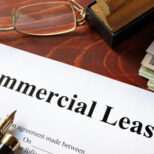
Solar Panels and Commercial Buildings
16th August 2023 by Claire Taylor
Commercial landlords are increasingly keen to show that their buildings are sustainable. With energy prices high and continuing uncertainty in the global energy markets, producing renewable energy on commercial buildings is more attractive than ever. Putting solar panels on a new building as you develop is relatively straightforward, but most landlords have to retrofit solar panels onto existing buildings. This may still make good business sense, but if you have tenants you will need your solicitor to help you navigate a few legal issues.
‘You and your tenants may agree on the idea of solar panels to cut energy costs,’ says Claire Taylor, a Partner in the Commercial Property team with Laceys Solicitors. ‘But it is still vital to ensure that installing them does not leave either of you in breach of the lease.’
Rights to the roof space
The first thing to check is who owns the roof space. Depending on the structure and layout of your building, you may find that the roof space was included in a tenant’s lease. Your solicitor will be able to check this by looking at the lease documents. If the roof has been let to a tenant, you will not be able to install solar panels unless the tenant agrees.
If the roof is not included in a lease, you may be able to carry out the installation without the tenant’s consent. However, your solicitor will also check the lease to see what it says about your rights to carry out works to the building, even if they cause some disturbance to your tenant. You will probably be under an obligation to keep disturbance to a minimum and you should be careful not to interfere with the tenant’s access to their premises. Even if the lease gives you a broad right to carry out works, it makes sense to engage with your tenants if you are going to install solar panels, because they should benefit from the cheaper energy which will be produced.
You may be approached by a tenant who wants to install solar panels themself. Even if you are happy for them to do this, you must get your solicitor to draft a licence for alterations which will set out the tenant’s obligations to carry out the works carefully and without causing any damage or nuisance. The licence should also deal with what will happen to the panels at the end of the lease. As solar installations have a life of at least 20-30 years, it may make more sense for you to reach an agreement with the tenant about installing them as landlord.
As well as putting solar panels on the roof of your building, you may be able to install a solar array at ground level or install solar panels on canopies over an existing car park. As with the roof, you will need rights in the lease to carry out works which will alter or interfere with common areas used by your tenants.
Third party providers
Solar panels are generally expected to pay for themselves in energy savings over around 12 years. If you do not want to incur the capital cost of buying and installing solar panels yourself, you could enter into a power purchasing agreement (PPA) with a specialist solar company. Under a PPA, you would grant a lease of your roof top to the solar company, who would then install and maintain the solar panels. You would get discounted electricity over the lifetime of the PPA (typically 20-25 years), after which you would inherit the solar panels. The advantage of this arrangement is that you would not need to invest capital, but it would mean adding a third party to any negotiations with your tenants. You must get a solicitor to review any PPA you are considering but you should be aware that it can be difficult to negotiate changes to the standard terms offered by providers and PPAs do not always fit well with the provisions of existing leases.
Selling the power you generate
Assuming you pay for and install your own solar panels, you will want to sell at least some of the energy you generate to your tenants. If it saves your tenant money they will probably be happy to buy it, but you should bear in mind that competition law in England and Wales currently means that a landlord cannot dictate which energy supplier a tenant uses. You will need to get your solicitor to produce drafting to cover the sale of energy to a tenant, which could sit in the lease or in a separate agreement. You may also be able to sell some energy to the National Grid. Unlike domestic property owners, commercial property owners are limited in how much energy they can export. The regulations change from to time, so your solicitor will check the current position for you.
Practical issues
There are a few practical things to consider in relation to solar panels:
- Do you need planning consent? In many areas, roof top solar panels are covered by permitted development rules, but you must get your solicitor to check. An array of solar panels at ground level is likely to require planning permission.
- Will works to the roof invalidate any warranties or guarantees from contractors? This is worth checking if your building is less than 12 years old.
- Who will pay for maintenance? As long as they are kept clean, the cost of maintaining solar panels seems to be fairly low, but you should consider whether it is possible to recover any costs from your tenants through the service charge. If you have installed panels in common areas like a car park, your leases may require you to credit some or all of any profit you make to the service charge pot, reducing the tenants’ contributions. Again, you must get your solicitor to review existing leases and advise you.
How we can help
Adding solar panels to generate your own electricity could be a very smart investment in your commercial buildings. Our expert lawyers will help you get the paperwork right and avoid any disputes with your tenants.
For further information, please contact Claire Taylor on 01202 377817 or email c.taylor@laceyssolicitors.co.uk
This article is for general information only and does not constitute legal or professional advice. Please note that the law may have changed since this article was published.



